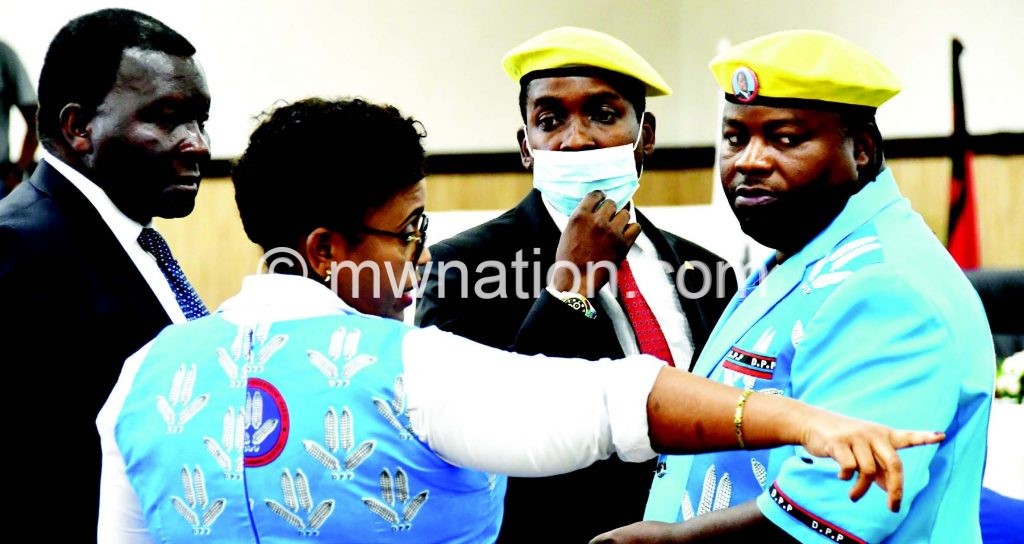DPP rebirth or death
Since Peter Mutharika lost the June 23 repeat presidential election, his Democratic Progressive Party (DPP) has been a house at war.
For the past three weeks, the former governing party has been torn apart by leadership wrangles, with some executives saying Mutharika is too old to keep calling the shots and legislators rejecting his chosen Leader of Opposition in Parliament Francis Kasaila.
The power struggles have created uncertainty over Mutharika’s future, especially whether he will retire from active politics as he promised in the run to the poll.

Just over a month after being ejected from State House, cracks started to emerge in the party following Mutharika’s silence to formally communicate his decision to retire.
However, in August, DPP regional governor (North) Christopher Mzomera Ngwira shocked the party’s enthusiasts when he said some party members were calling for new blood to start rebuilding the party.
Days later, DPP secretary general Grezelder Jeffrey reiterated that the party needed a new person to lead it to the next presidential election in 2025.
She said: “The party now needs to meet and discuss the matter.
“Professor Mutharika has done his part and he will not contest again in future. He is retiring and we need to choose a new leader.”
DPP constitution gives the secretary general the power to organise the party convention, said Jeffrey.
However, Mutharika unilaterally suspended her from her position and banned her from attending a national governing council meeting at his retirement home in Mangochi.
Widening row
Since then, the party has degenerated into chaos, summoning its vice-president (South) Kondwani Nankhumwa to a disciplinary hearing for allegedly sidestepping Kasaila to appoint himself Leader of Opposition in Parliament.
Fast-forward to this month, the row is widening further. Two weeks ago, DPP’s central committee fired Nankhumwa, Jeffrey, treasurer general Jappie Mhango and Mulanje West legislator Yusuf Nthenda for alleged indiscipline.
The four obtained a court order against their sacking just before Mutharika hosted some DPP legislators in Mangochi as Nankhumwa and his allies addressed a rally in Bangwe Township, Blantyre.
While Jeffrey had reportedly mended fences with Mutharika, she insisted that a convention was the best platform to elect Mutharika’s successor and calm the infighting.
However, Mutharika recently stated that he is neither clinging to the party’s presidency nor planning to impose any candidate, but just wants a smooth transition.
He said: “No one should hijack the party. The party has instituted a functional review committee [chaired by vice-president for Eastern Region Bright Msaka] which will conduct research on why the party performed poorly [in June 23 fresh presidential election] and make other findings.
“They will deliver the report to me by October 31 and then the national governing council will set a date for a convention where office-bearers will be elected,” he said.
Even so, Jeffrey says the exercise may not change anything as some of the committee members, who were also involved in writing the party’s losing manifesto, might not bring fresh ideas.
“My advice right now is that we need a convention. The NGC has not met since June 23 and the people in the review have their own interests… Some want to be president, some Leader of Opposition in Parliament, and then you want them to make reforms?”
Pruning process?
Political analysts say the DPP is going through a natural process of change, which is good for a rebirth.
However, they warn that that the bickering may further weaken the main opposition party and lead to factionalism much to the peril of the country’s democracy.
The scholars reckon the government requires a strong opposition to provide checks and balances to the governing party.
Mustafa Hussein, a lecturer in political and administrative at the University of Malawi’s Chancellor College (Chanco), says firing party executive leaders is a sign of deepening factionalism.
He says: “It’s a disaster! It spells doom for DPP because that is political intolerance of the highest order. It shows failure on the part of leaders to resolve issues within the party amicably.
“These people [being fired] have their admirers, sympathisers and others may leave the party because of these signs of political intolerance. It is a worrisome development and may lead to further weakening of the opposition in the country.”
Concurring, Political Science Association president Joseph Chunga, who also teaches at Chanco, says if a few people maintain their grip on the party, it may get weakened and give birth to a splinter party or mass defections.
Mzuzu-based political analyst Emily Mkamanga argues that the power struggle may destroy DPP unless a solution is found swiftly.
“Currently, the future of DPP looks bleak,” she says.
However, Centre for Multiparty Democracy executive director Kizito Tenthani says intraparty fights in some political parties is good for their survival.
He says the conflicts will help the troubled parties to identify weaknesses and build back better.
Speaking last week during a post-election healing session, without mentioning any specific party, he observed that post-election conflicts within political parties are necessary because they are the only way parties can emerge stronger.
Said Tenthani: “If you look at the fight, it is a symbol that something is not right within their democratic structures and that will be a way of trying to redefine for them to move on.
“It means that some of its structures are not resilient enough to ensure that the party can move itself further.” n





